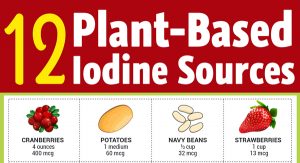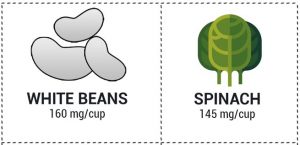Veganism isn’t just an easy way to reduce animal suffering and environmental damage, it’s a dietary choice that, when done correctly, can massively improve your health and longevity. The scientific research is so strong in this regard that… [Read More]
12 Plant-Based Iodine Sources (Infographic)
Traditionally sourced from the sea, iodine is required by the body to make thyroid hormones. The body also needs thyroid hormones for proper bone and brain development during pregnancy and infancy…. [Read More]
Backyard Chickens: What Came First, the Egg or the Exploitation?
What’s wrong with raising backyard hens? The hens get to roam around the land – eating a fairly natural diet – you house them in a coop, get them vaccinated, and in return receive their eggs. Furthermore, what’s… [Read More]
What Do Vegans Eat? A Walk Through My Kitchen Cupboards
Vegans eat tree bark, grass and lettuce. Hehe! But seriously, for many, a world without meat seems strange. What would you eat if not bacon, chicken nuggets and beef burgers? No bacon in the morning? No omelettes or… [Read More]
15 Natural Antibiotics Provided by Mother Nature
We’ve all heard of antibiotics — you may have even taken one in the event that you got a stomach bug or another kind of infection. But what is an antibiotic, really? Also known as ‘antimicrobial drugs,’ antibiotics… [Read More]
Can Cats Be Vegan? Here’s What the Science Says…
Can cats be vegan? Well no, because cats don’t have the critical thinking capacity to consider the moral implications of breeding animals to eat, or indeed the subsequent use of their skin, fur and bodily by-products to produce… [Read More]
25 Plant-Based Calcium Sources (Infographic)
Calcium is found in numerous fruits, vegetables and nuts, so you certainly don’t need milk to have healthy bones. This infographic shows you 25 of the best vegan calcium sources, and tells you how much you need to eat to meet your RDA. Share with your friends and family, and print one out for your wall!… [Read More]
This article is based evidence-based. This means that the statistics, data, and statements made are based on information taken from research studies published in medical journals and by health organizations.
The numbers in the parentheses (1, 2, 3) are clickable links to peer-reviewed scientific papers and other reputable, trusted resources.
What B12 Should You Take? Methylcobalamin Vs Cyanocobalamin
Before we dig further into methylcobalamin vs cyanocobalamin and look at the science, let’s just briefly cover why B12 is so important. In a nutshell: B12 keeps your nerves and red blood cells healthy, and takes responsibility for the… [Read More]
This article is based evidence-based. This means that the statistics, data, and statements made are based on information taken from research studies published in medical journals and by health organizations.
The numbers in the parentheses (1, 2, 3) are clickable links to peer-reviewed scientific papers and other reputable, trusted resources.
10 Plant-Based Tryptophan Foods That Skyrocket Your Serotonin
Tryptophan & Serotonin | Deficiency | Production | The turkey myth | Arachidonic acid | Carbs & serotonin | Depression | Vegan Sources | Supplements Tryptophan is an amino acid found in foods that contain protein. Amino acids… [Read More]
6 Expert Tips for Growing Mint (Plus a Nutritional Benefits Breakdown)
Mint is super underrated. In fact, herbs are in general. We lack knowledge of the benefits because it simply isn’t being passed on like it once was. Ancient cultures used herbs for medicinal purposes and to obtain valuable… [Read More]









